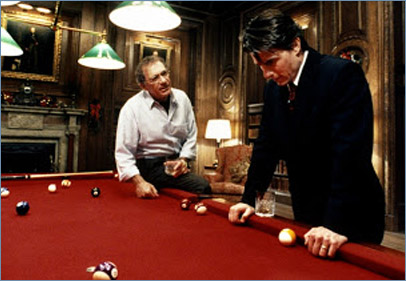Now Playing: Grateful Dead 2/11/69 Fillmore East
Topic: E
Much like the 'Gomer Pyle' problem (see Full Metal Jacket comment) I've been waiting for the coin to drop regarding the master's last cinematic offering, EYES WIDE SHUT (1999). On first viewing it seemed kind of slow-moving and with a curious insistence upon certain elements which didn't seem particularly eyebrow-raising, such as the main couple's potential infidelity, or the extreme secrecy of the VIP sex mansion. It also featured a number of marvellous scenes, not least the opening ballroom with its unearthly lighting and flawless direction. And while the mansion swinger party seemed off-target, the best scenes in there (primarily when Tom Cruise's protagonist is exposed) had the Kubrickian magic that sticks in your memory forever even after just one viewing. All in all, I assumed that these high points hinted of the potential power of the entire movie, once I had fully integrated it... because this is how Kubrick films tend to operate for me.
But after catching Eyes Wide Shut on late night TV the other day, I'm afraid the verdict must be the same as on 'Gomer Pyle': it just doesn't work. And here we're talking about a whole movie, not just certain scenes with a non-protagonist character. I actually felt embarrassed on Kubrick's behalf as I watched the "so what" sequences of infidelity and open sex that he makes such a fuss over, as though he was some old man out of touch with the modern era. I don't think that was the true problem, but rather something connected with his literary inspiration (Arthur Schnitzler's 1926 novella) for the movie, and how he personally viewed the themes he dealt with. Happily married for 40 years, and not one likely to deal in casting couches and Charlie Sheen style whore binges, one must wonder just how much Kubrick understood of the material he dealt with in Eyes Wide Shut.
With a rising amount of pain I watched the scene where Sydney Pollack passes on a warning to Cruise's confused doctor to stop his inquisitions about the mansion. The scene is inexplicably drawn out, with long pauses between the lines, even as the dialogue is quite ordinary film noir fodder. Pollack's character displays a completely overstated embarrassment for the whole affair, which jars strangely with the opening of the movie which finds him revealing to Dr Harford (Cruise) that he was having sex with a drugged out young prostitute. Given such a lifestyle, why should this wealthy New Yorker feel any hesitation whatsoever in telling a young doctor to stop snooping where he doesn't belong. The scene just doesn't make sense, and the dialogue is bland and predictable, and the pace grinds to a complete halt. It's ironic that the room has been equipped with a very Kubrickian red pool table instead of the customary green, creating a red rectangle which almost seems to float by itself and adds a grim tone to the scene... which fails in almost any other way.
But it's not individual scenes, some of which are in fact brilliant, that weigh Eyes Wide Shut down--it is the treatment of the material, and the emphasis on what seems to be the wrong elements. It is, in the 2000s, hard to understand why Cruise's doctor reacts so strongly when his wife (Nicole Kidman) reveals an old sexual fantasy for him. It simply isn't very shocking, and since the viewer does not understand the young doctor's reaction, it becomes hard to empathize with him. Similarly, why would a secluded mansion where VIPs meet to have free sex be such a big deal that people get killed for it, and that others are threatened to their lives? The only thing we see in there are a bunch of cool masks and people performing completely normal sex acts. So what? While one can't say for sure that these things occur in precisely this way, I doubt many would be surprised if it was revealed in this day and age.
As the movie neared the end I kept thinking that it would have been much more credible and effective if the mansion orgies had been harsh S & M stuff, where people bled and wept, and others acted out sick fantasies, and call girls died not because of some mysterious omerta, but as an effect of the violent sexual practices. This would also have formed a more impressive nadir for the protagonist's night journey into himself, and contrasted sharply with the cozy Manhattan family residence of the doctor and his wife. The final misstep occurs when Mrs Harford unexpectedly has found the costume mask that her husband just had stashed away in a safe, and in a dramatic gesture places on his pillow. Again, why is this mask such a big deal--and why would she suspect that it is? Maybe it was a gift he was planning to give her? Instead he breaks down and promises to tell 'everything' about his night on town, and again the whole thing seems bizarrely overstated and, I hate to say this, old-fashioned. 6 of 10
